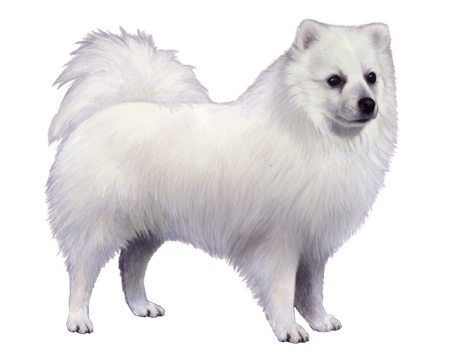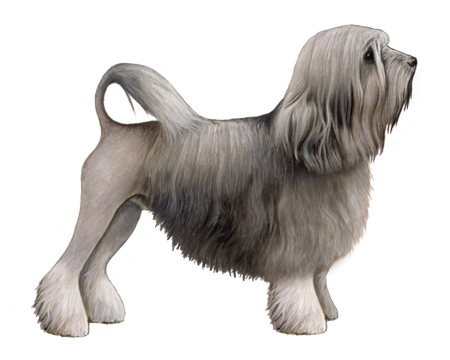
Shih Tzu
The Shih Tzu is an outgoing and affectionate dog. They love people and cherish their roles as adorable lapdogs. Shih Tzu are especially fond of children and make great pint-sized playmates.
Interested in discovering if your dog is a Shih Tzu?
Check out Wisdom Panel's DNA tests.

Shih Tzu Traits
General Appearance
Shih Tzu are small, compact dogs with good weight and substance. True to their noble heritage, the breed has a proud bearing, arrogant carriage, trusting expression, and smooth, effortless gait.
Coat and Colouring
Shih Tzu have a luxurious double coat with dense, long, flowing hair. The hair on their heads is tied up to keep it from their eyes. All colors are acceptable and commonly include black, black and white, blue, brindle, gold, liver, red, red and white, and silver.
Distinctive Physical Traits
Shih Tzu have level toplines and large, round eyes set well apart that give them warm, sweet, wide-eyed expressions. They also have large, heavily coated ears, slight (adorable) underbites, and heavily plumed tails that are high set and carried in curves over their backs.
Shih Tzu Temperament
These petite, quiet pups make excellent companions and house (or apartment) pets. Their personalities are usually outgoing, happy, affectionate, friendly, and trusting. Shih Tzu are true lap dogs and prefer having their owners around most of the time. If left alone for long periods, these dogs can become unhappy or anxious.
This extroverted breed likes being around people, performing tricks, and showing off their friendly dispositions. Although Shih Tzu are great with children and other pets, supervision is required to ensure these small dogs don't get hurt.


Shih Tzu History
The Shih Tzu—or "lion dog"—is an ancient breed with interesting (and somewhat unknown) roots.
One theory is that the development of the breed began in Tibet, China. As the story goes, the Dalai Lama gave the Emperor of China a Lhasa Apso in the 17th century. The dog mated with a Pekingese in the palace, and the first litter of Shih Tzu puppies arrived shortly after.
In the palaces, emperors pampered the dogs, doting on them and meeting all of their needs in exchange for affection. The breeders were treated well, too, and received gifts for producing the most beautiful dogs. The breed was unknown outside of palace walls, and populations were so small that Shih Tzu almost became extinct in China after the Communist Revolution.
The first breed clubs were formed in Peking (now Beijing) in the 1930s. A decade later, U.S. military personnel brought several Shih Tzu back to the United States. The little dogs quickly became (and remain) one of the most popular toy breeds. A total of fourteen dogs—seven males and seven females—make up the entire breed's foundation stock.
Shih Tzu Care
Nutrition
Shih Tzu require high-quality dog food that's appropriate for their life stage (e.g., puppy, adult, senior). A diet designed specifically for small breed dogs is a good option to consider.
Shih Tzu are prone to obesity. Help them stay a healthy weight by portioning out their meals with a measuring cup to avoid overfeeding. And limit treats to no more than 10% of their daily calories (no matter how much they beg with those puppy-dog eyes).
Grooming
Shih Tzu with a shorter "puppy cut" require less grooming than dogs with unclipped coats. If their coats are left long, Shih Tzu require daily brushing. To keep painful mats from developing, brush their hair in layers to ensure the comb reaches their skin. Pinning up the hair on top of their heads can prevent eye irritation (and make a fashion statement). A bath at least once a month will help keep their coats clean and looking their best.
In addition to keeping their nails trimmed and ears cleaned, start a regular dental care routine. At-home teeth brushing and professional dental cleanings are part of an essential and lifelong dental hygiene program.
Exercise
Shih Tzu have moderate exercise needs. These social dogs love going for walks and exploring at the dog park—as long as they remain separate from larger dogs. They also enjoy playing hide-and-seek or fetch with their owners. And use games and tricks to provide much-needed mental stimulation. These little dogs can be big fans of activities like agility, competitive obedience, and canine musical freestyle.
Shih Tzu are not known for their stamina, so focus on short bursts of exercise and look for cues (like panting or falling behind on a walk) that signal it's time for a break. Despite having thick coats, these small dogs are vulnerable to the cold. They shouldn't spend long periods outside in cold temperatures.
Training
Shih Tzu are quick learners with stubborn streaks and may use their charm to get their way. A consistent, structured training program can help them learn basic commands and new tricks. These are sensitive dogs that respond best to positive reinforcement and reward-based training, not harsh training methods.
Like other small breeds, Shih Tzu can struggle with housetraining and may be prone to barking. A gentle but firm approach to training can promote positive behaviors.
Start introducing Shih Tzu to new people, pets, and places as puppies. Positive experiences are an essential part of [socialization](

Shih Tzu Genetic Health Conditions
-
Congenital Dyshormonogenic Hypothyroidism with Goiter (Discovered in the Shih Tzu)
Congenital Dyshormonogenic Hypothyroidism (CDH) is a rare condition causing a defect in iodide transport and a subsequent reduction in the synthesis of thyroid hormones, resulting in hypothyroidism and goiter.
-
Chondrodystrophy (CDDY) and Intervertebral Disc Disease (IVDD) Risk
Chondrodystrophy (CDDY) is a skeletal disorder characterized by shortened limbs and abnormal early degeneration of the spinal discs, or intervertebral disc disease (IVDD), which predisposes to disc herniation.
-
Prekallikrein Deficiency
Prekallikrein Deficiency is a disorder which causes blood to take a longer time to clot.
Knowing if your Shih Tzu is a carrier or at-risk for these conditions can help you and your veterinarian plan for your pup's lifelong care. With Wisdom Panel™ Premium, you can get results for over 200 genetic health tests.
Breed Group
Companion
This group consists of dogs typically bred for the specific purpose of human companionship, and many are popular pets because of their gentle nature. They became more common as the concept and luxury of dogs as pets prevailed.
Resources
https://www.akc.org/dog-breeds/shih-tzu/
https://vcahospitals.com/know-your-pet/dog-breeds/shih-tzu
http://images.akc.org/pdf/breeds/standards/ShihTzu.pdf
Reviewed 26 July 2020 by Cindy Elston, DVM, MPH



























_Color.png)










